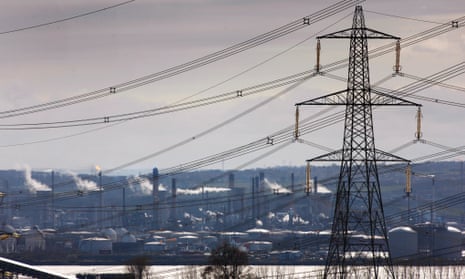The UK has announced an ambitious new carbon target for the early 2030s, allaying fears that the climate goal would be a casualty of the EU referendum.
Amber Rudd accepted the advice of the government’s statutory climate advisers, setting a target on Thursday of reducing carbon emissions 57% by 2030 on 1990 levels.
The legally binding “fifth carbon budget” laid in parliament today is tougher than the carbon emissions target the UK is signed up to as part of the European Union, which requires a 40% cut by 2030 on 1990 levels.
The commitment should ease anxieties in the green energy sector that last week’s leave vote would water down the UK’s leadership on climate change, or that the decision to approve the budget would be left to the next prime minister.
John Sauven, Greenpeace UK director, said: “The government has kept its word to adopt this important target to limit the UK’s carbon emissions.”
Business groups said the move was an important step and energy companies said they welcomed the clarity it provided. The renewable energy industry said the budget sent a “clear signal”, a sentiment echoed by the the manufacturers’ organisation, the EEF.
Barry Gardiner, Labour’s newly appointed shadow energy and climate secretary, said: “I recognise the difficulties that the energy secretary has faced from many of her colleagues in simply securing this agreement, particularly in the aftermath of the vote to leave the EU.”
But he added the government must now bring forward the publication of its plan to bring down emissions, “to reassure investors, plug capacity gaps and keep bills down”.
The Committee on Climate Change, which advised on the level of cuts needed, has previously written to ministers to warn that there are not yet the policies in place to meet the target.
Sauven said: “It’s no good having numbers on spreadsheets without the delivery to match. The absence of clear government plans and support for action on renewable energy, homes, cars, agriculture and planes shows how far the rhetoric of climate action has drifted from anything real.”
Tom Burke, chair of the environmental thinktank E3G, welcomed the budget but said it meant new policies were needed: “It will mean that the government will have to double down on a new cost-effective energy strategy which reduces reliance on imported gas. This means it must make energy efficiency an infrastructure priority to slash energy demand in UK homes by half.”
The fifth carbon budget was set as provisional data released on Thursday showed total greenhouse gas emissions were down 6.2% for the year to Q1 2016. Emissions last year fell as coal use plummeted.
On Wednesday, Rudd said that the UK’s commitment to tackling global warming was undiminished by last week’s leave vote, but action had been made harder by Brexit.
Her energy minister, Andrea Leadsom, a prominent Leave campaigner, also said the UK was committed to the Climate Change Act, the law which mandates today’s carbon budget.
Simon Bullock, Friends of the Earth senior climate campaigner, said: “After the huge confusion following the Brexit vote, we welcome the certainty this decision [the fifth carbon budget] gives.”
The target covers reductions between 2028 and 2032, and means no more than 1,725m metric tons of carbon dioxide equivalent (MtCO2e) can be emitted during that period. In 2015, the UK emitted 497 MtCO2e.
The target is part of a series of budgets designed to ensure the UK meets the Act’s commitment of bringing emissions down 80% by 2050.
MPs on the energy and climate change select committee and a group of 20 Tory MPs were among the many businesses and green groups who have called on minister to accept the steep reduction in emissions.




Comments (…)
Sign in or create your Guardian account to join the discussion